Will Marissa Alexander get second shot at Self-Defense Immunity?
Awaiting Court ruling after 3-hour hearing.
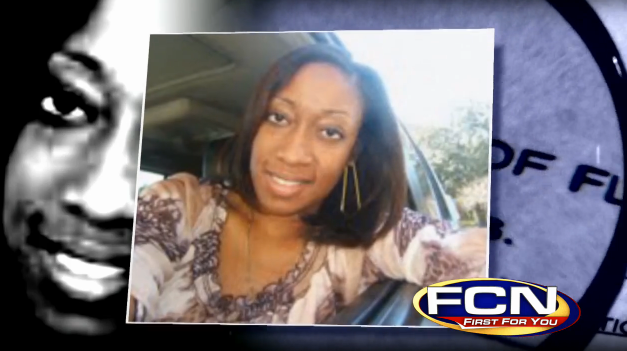
Well, three hours of a pre-trial hearing on whether Marissa Alexander should be permitted yet another pre-trial self-defense immunity hearing wrapped up this morning. Rather than bury the lede, here’s the bottom line.
No decision.
Instead, Judge James Daniel elected to schedule still another pre-trial hearing on whether Marissa Alexander should be permitted yet another pre-trial self-defense immunity hearing, this one being scheduled for June 10, at 10:00AM. Daniel’s apparent uncertainty about how he would rule was apparently all but palpable in the court room.
On the plus side, Judge Daniel did suggest that at the June 10 meeting to decide whether to have a second self-defense immunity hearing, if the decision was in the affirmative the would likely hold that self-defense immunity hearing that same day.
Judge Daniels did re-affirm that he continues to intend to pick the jury the week of July 21 and start the trial on July 28.
The blow-by-blow was followed by your trusty self-defense lawyer via the very imperfect means of a live tweet channel hosted by The Florida Times-Union, in the person of the courts reporter Larry Hannan (@LarryHannan). I also use some later tweets from Rhema Thompson, (@RhemaThompson) a reporter with WJCT news. Unfortunately, there was no live streaming of this hearing.
As one would expect, Hannan is a journalist, not a lawyer. While he did a fine job in live-tweeting and seemed (as best I could judge from internet distance) to capture the key legal points, there were the usual stumbles one must expect under the circumstances. For example, the repeated labeling of this self-defense immunity hearing as a “stand-your-ground” hearing. The latter does not legally exist, but the misnomer is practically institutionalized in the press (and, too often, in the courts, as well). Whether more subtle legal issues were missed, I cannot say.
Hannan reported that there appeared to be few members of the public at the hearing, attributing this to the early hour (8:00AM is early?). Judge Daniel called to hear the defense motion seeking a second self-defense immunity hearing.
You will recall that Alexander had received an earlier self-defense immunity hearing, prior to her first trial, and been denied immunity. In that hearing Judge Elizabet Senterfitt ruled that Alexander’s decision to return into the house, after having armed herself, to confront her husband was not consistent with a “genuine fear” of death or grave bodily harm.
Here, Alexander has new legal counsel, in the person of Faith Gay. Attorney Gay is a well respected civil and white collar crime attorney. She has little if any background as a criminal defense attorney, although she did argue the appeal that successfully won Alexander her retrial. While this appeal was sound work the trial jury instructions were clearly defective, and that being the case the victory at appeal does not necessarily indicate a high degree of criminal defense skill. We shall see.
The State prosecutors office was represented by Richard Mantei, our old friend from the trial of George Zimmerman.
Inordinate Time Spent Discussing (In)Applicability of Florida’s “Warning Shot” Bill
Perhaps one of the oddest portions of today’s pre-self-defense immunity hearing was the inordinate amount of time spent discussing Florida’s recently passed (but not yet signed) “warning shot” legislation.
This was odd for several reasons. First, having not been signed the bill is not yet law.
Second, even when signed, it will almost certainly not apply retroactively—in general, a new law must explicitly state it is to apply retroactively in order to be so applied, and the passed bill contains no such language.
Third, even if the “warning shot” bill were about warning shots—and it isn’t—there were no warning shots in this case. As discussed previously here at Legal Insurrection—see, The Myth of Marissa Alexander’s “Warning Shot”–crime scene photos make clear that Alexander did not merely “fire up into the air,” as her supporters falsely claim, nor did she merely “fire into the ceiling,” as they misleadingly argue.
(The defense’s last motion of the day, discussed at the end of this post, revealed how they intend to deal with this unfortunate forensics evidence fatally undermining Alexander’s narrative of innocence.)
Alexander stood several feet away from her husband, Rico Gray, and his two minor children, pointed a pistol at them, said, “I’ve got something for your ass,” fired a round—which would be VERY loud indoors—sending a bullet inches past Gray’s head, into the wall behind him, out the other side of the wall, and into the ceiling of the next room. No reasonable person would conclude that was anything other than a missed shot.
Fourth, even if the “warning shot” bill applied to warning shots, and even had Alexander fired a warning shot, the (non-)warning shot fired by Alexander still wouldn’t fall within the scope of the bill. That bill explicitly requires that any threat of self-defense force must not “pose a threat to public safety.” A bullet fired past the head of Gray, and within inches of two minor children who presented no threat whatever, then continues on blindly into another room, clearly poses “a threat to public safety.”
Finally, the “warning shot” bill doesn’t miraculously change a non-self-defense shooting into a self-defense shooting. It merely provides that if the use of force would otherwise have been justified—e.g., the shooter was not the aggressor, they were facing an imminent threat of death or grave bodily harm, they used no more force than was necessary, and their conduct was both subjectively and objectively reasonable—then the mere threat of force would also be lawful. But unless those four elements of self-defense are ALL met then BOTH the actual “use” of force AND the “warning shot” are unlawful.
Under the facts in this case Alexander simply has no credible claim of self-defense at all. She left the scene of unarmed conflict, achieved a place of safety (her garage) un-pursued, retrieved a deadly weapon (her pistol), returned to the scene of conflict, verbally threatened Gray and his children, then fired at and (accidentally, it seems) past them. That is not self-defense, and cannot justify either the use or the mere threat of force.
Despite all this, an interminable time was spent by both Judge Daniel and the State and defense counsel in talking about the “warning bill” statute, whether it would be applied retroactively, and a lot of related, and irrelevant, nonsense.
Mantei would find himself compelled to argue that even were the “warning shot” bill already law, it would not apply retroactively.
Further, Mantei argued, should Judge Daniel decided to hold a self-defense immunity hearing, it would have to be governed by the then-existing law, and not consider the “warning shot” bill.
Defense Argues Stand-Your-Ground Means You Can Advance on Your Adversary
Next up in terms of irrelevant defense arguments was “stand-your-ground.” Here the defense argued that Alexander had the right to be in her home, did not have a duty to retreat, and that the fact that she advanced on Gray before firing doesn’t matter. (This last being an astonishing concession, presumably the defense considers it unimpeachable at trial.) Judge Daniel agreed that if a person is in a place they have a right to be, they have no duty to retreat.
Again, there are several reasons for why this line of argument is silly.
First of all, stand-your-ground is irrelevant under the facts of this case, as they occurred within Alexander’s home (I’m setting aside, for practical purposes, the argument that it was Gray’s home but not hers, as I don’t think it tenable.) If you are inside your home you already have no duty to retreat under the Castle Doctrine. So there’s simply no application for a second legal excuse from a duty of retreat that no longer exists.
Second, just as with the “warning shot” bill, stand-your-ground doesn’t magically change a non-defensive use of force into lawful self-defense. It merely relieves you of one of the five elements of self-defense. You must still have not been the aggressor, have been facing an imminent threat of death or grave bodily harm, have used no more force than was necessary, and been both subjectively and objectively reasonable. Within this framework Alexander’s conduct fails as self-defense in exactly the same manner as it did under the “warning shot” bill.
In response, Mantei argued that although Alexander would not have had a duty to retreat, this did not mean she was allowed to advance on Gray after going into the garage.
Defense Claims Gray’s Children Lied at First SD Immunity Hearing, Have Recanted
The defense’s claim that Rico Gray’s minor children lied at the original self-defense immunity hearing would seem to be the strongest hook on which to hang their motion for a second, de novo self-defense immunity hearing, as it’s the only claimed “new evidence” claimed by the defense. That said, it is a weak hook, indeed.
First of all, the mere fact that a witness recants their testimony is no more grounds for a new hearing than it would be for a new trial. If a witnesses’ testimony is to be challenged, it must generally be done at the original hearing or trial. Otherwise there would be little certainty in a criminal justice system subject to “do-overs” at the whim of any particular witness. Judge Daniel focused on this defect of the defense’s claim at length.
Second, the children’s earlier testimony that they “thought we were going to die” when Marissa Alexander pointed that pistol at them and fired can only have been extraordinarily compelling. It did not, however, stand alone—the crime scene photos documenting the trajectory of the bullet strongly supports their original testimony.
It is simply not credible that faced with an angry, armed woman firing a pistol indoors at them from only feet away, that they were not for fear of their life. Any such recantation surely lacks any serious credibility. Perhaps this is why Mantei was amenable to having the children appear before Judge Daniel as part of his review of the defense’s motion for a second self-defense immunity hearing.
In any case, Mantei noted that there had been inconsistency in the children’s statements even before the first self-defense immunity hearing, and thus any “recanted” statements to be offered now were merely cumulative to what had already been considered, not new evidence to justify a second self-defense immunity hearing.
Mere Fear is Sufficient to Justify Deadly Force Defense
The defense then went on to make yet another remarkable self-defense law claim. Gay argued that as long as Alexander was in her home, if she is in imminent fear of harm she has a right to fire a gun.
Again, deadly force self-defense cannot rest solely on a subjective fear of harm.
First, the harm feared must be one of death or grave bodily harm. Second, the fear must be both subjectively and objectively reasonable. Third, Alexander must not have been the aggressor. Fourth, she must have used no more force than necessary.
Fail, fail, fail, and fail.
Defense Arguments Devolve Into Begging; State’s Into “Nothing New to See Here”
From that point forward the defense’s proffers began to sound a lot less like legal arguments and a lot more like begging. At one point, for example, Gary argues that a second self-defense immunity hearing is required simply because of the seriousness of the 60-year sentence faced by Alexander.
Mantei kept beating, quite appropriately, on the drum of “nothing new to see here,” noting that all the issues being raised by the defense had already been considered by Judge Senterfitt in her denial of self-defense immunity at the earlier hearing.
Mantei also noted that the appellate court had affirmed Senterfitt’s denial of self-defense immunity. In response Daniel noted that the same appellate court had also overturned Alexander’s earlier conviction and ordered a re-trial.
This seems utterly unresponsive to Mantei’s point, however, in that the earlier conviction was overturned on the basis of defective jury instructions on the burden of proof in self-defense, not on anything having to do with self-defense immunity.
When Mantei rested, Defense Counsel Gay had an opportunity to rebut. Judge Daniel started things off by noting that the defense had the chance to present any relevant evidence at the first self-defense immunity, and inquiring what “manifest injustice” occurred then. Gay’s response not so subtlely suggested that Alexander’s earlier legal counsel simply hadn’t been sufficiently capable to make the best argument on behalf of their client.
Gay also threw in a variety of other arguments, including that the wrong legal standard was applied in the first self-defense immunity hearing (the one later approved by the appellate court), and that Rico Gray’s history of violence against women wasn’t addressed in the first self-defense immunity hearing (presumably at any second hearing the State can present evidence of Alexander’s arrest for her assault upon Gray, the attack that resulted in revocation of her bail).
Of course, any such history of violence was already known at the time of the first self-defense immunity hearing, and is not new evidence that can support a second such hearing.
Defense Requests Subpoenas for Wide Variety of Privileged Marital Communications
After a brief 5 minute recess following Judge Daniel’s announcement that he was not going to decide the self-defense immunity motion today, the court returned to session and Defense Counsel Faith Gay began requesting subpoenas for a wide variety of marital communications generally considered privileged and immune from discovery. In particular, the defense wanted access to records and notes of a variety of marital counseling sessions between Gray and Alexander, from both private and group therapy sessions.
State Objects to Defense’s Draft Jury Questionaire, Judge Daniel Agrees Too Lengthy
Defense Seeks to Suppress All Physical Evidence from House
The defense saved the most outrageous of its requests for the end of the hearing, however.
They—and I’m not kidding—submitted a motion that Judge Daniel suppress all physical evidence obtained from the scene of the shooting.
There’s an old saying in the law: If the facts are on your side, pound the facts. If the law is on your side, pound the law. And if neither is on your side, pound the table.
Here we’re seeing an unusual variation: if the law is NOT on your side, try to obfuscate it as much as possible, and if the facts are NOT on your side, try to memory-hole then via suppression.
I’m certain indeed that it would make Defense Counsel’s case a great deal easier if she could “disappear” that bullet hole in the wall behind the heads of Rico Gray and his two minor children.
Judge Daniel declined to hear that motion today, given the length of time such a hearing was likely to take.
And that wrapped things up for today’s Marissa Alexander hearing.
Expect we’ll all be back in court on June 10 to once again consider whether to move forward with a second self-defense immunity trial.
Donations tax deductible
to the full extent allowed by law.

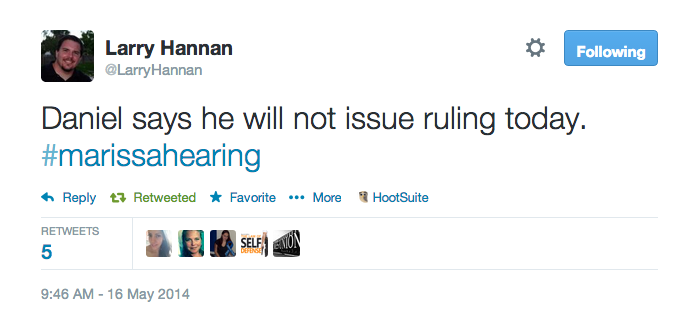
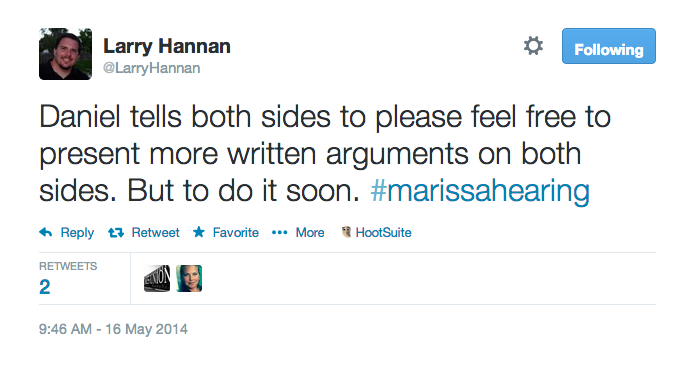
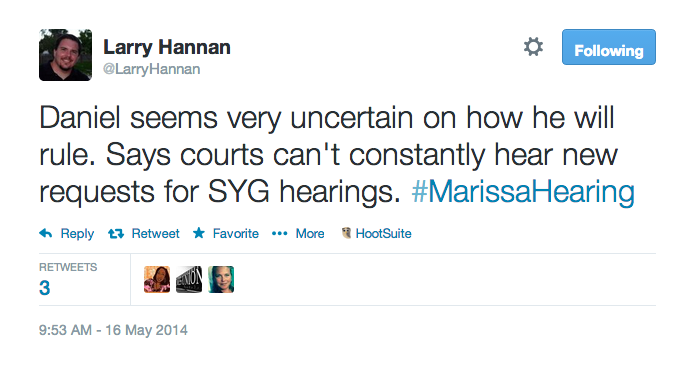
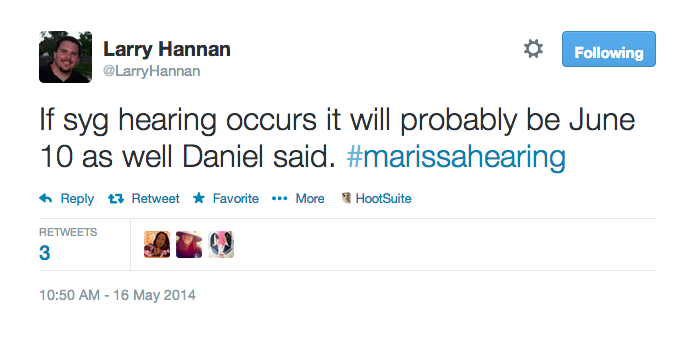
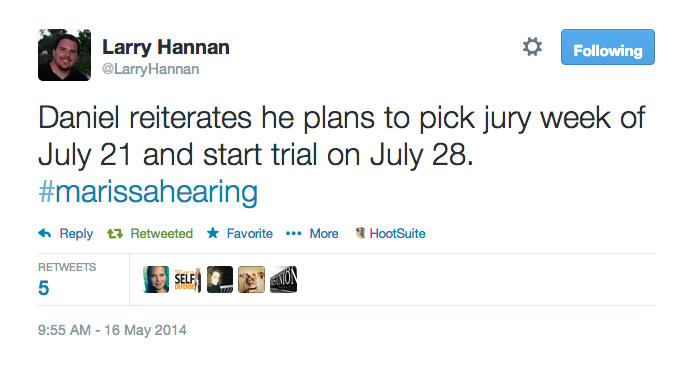
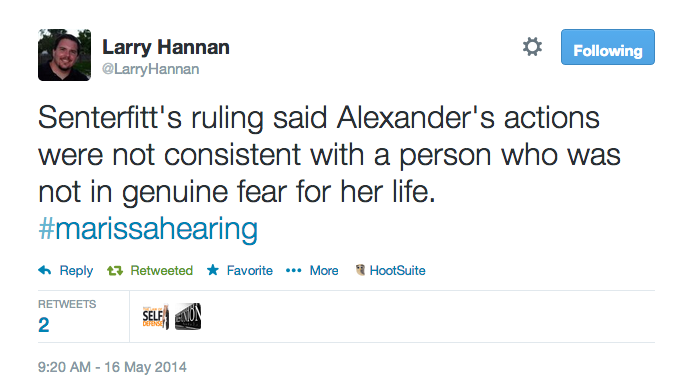
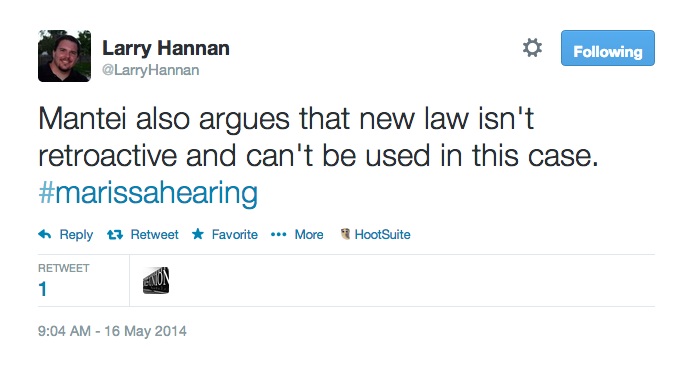
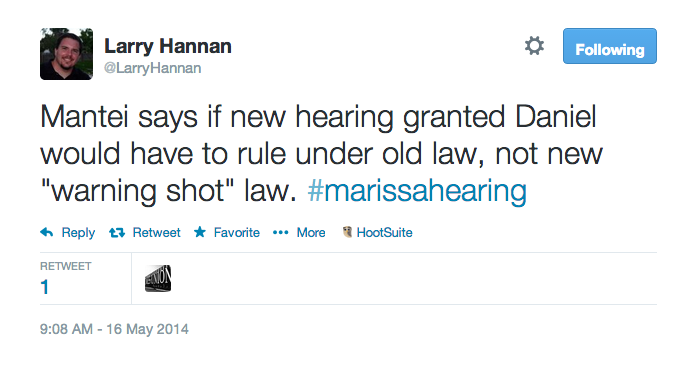
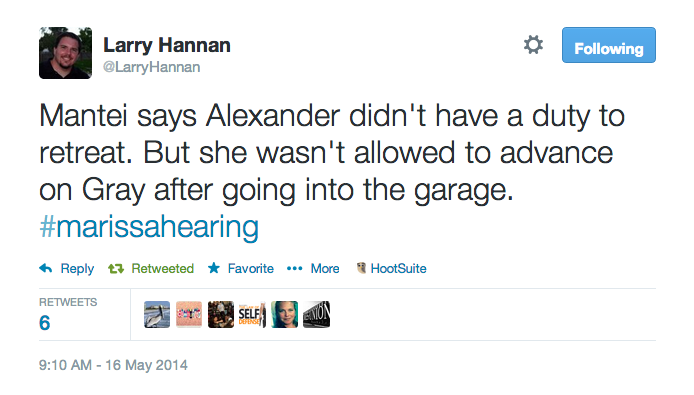
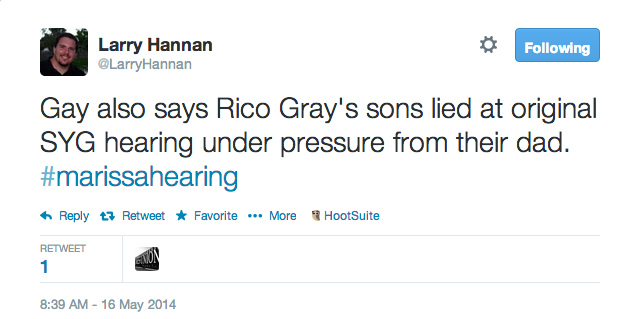
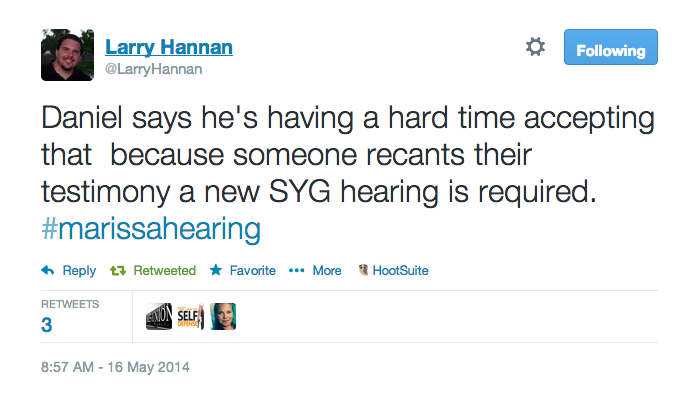
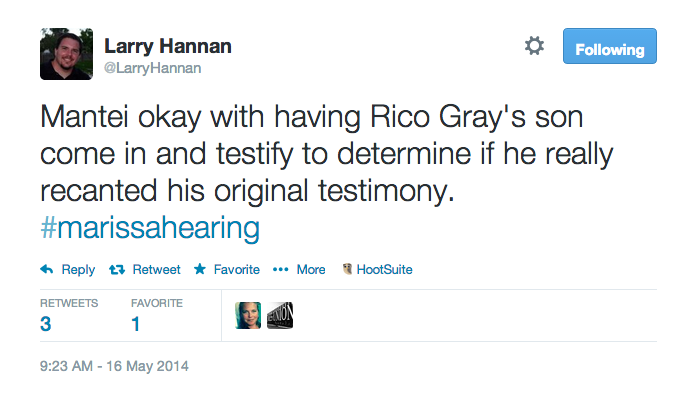
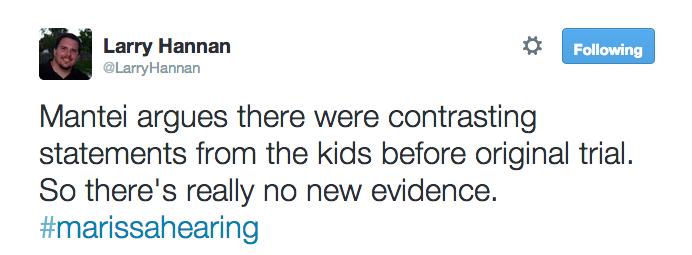
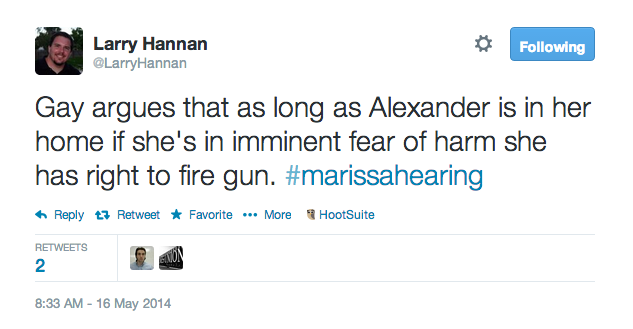
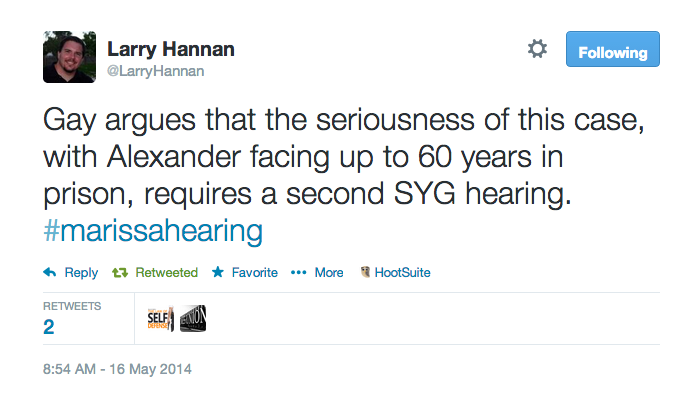

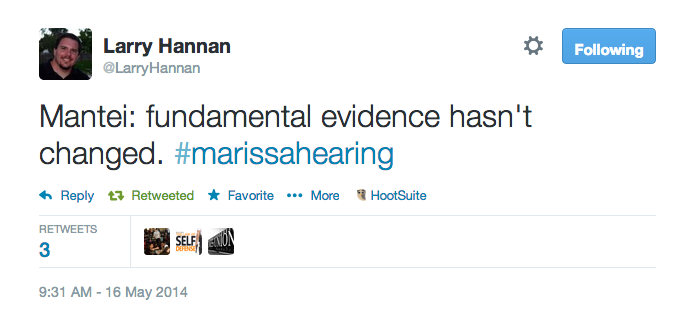
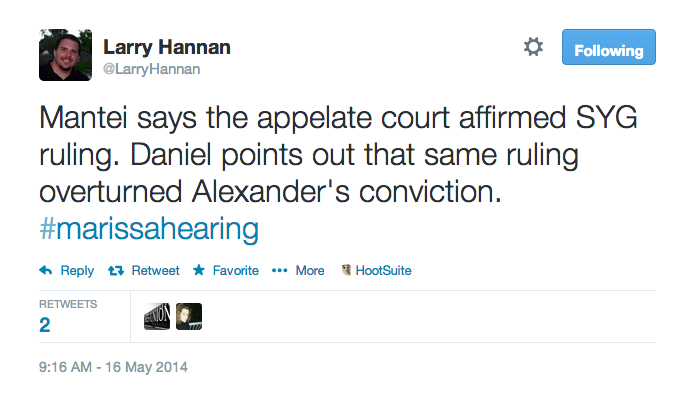
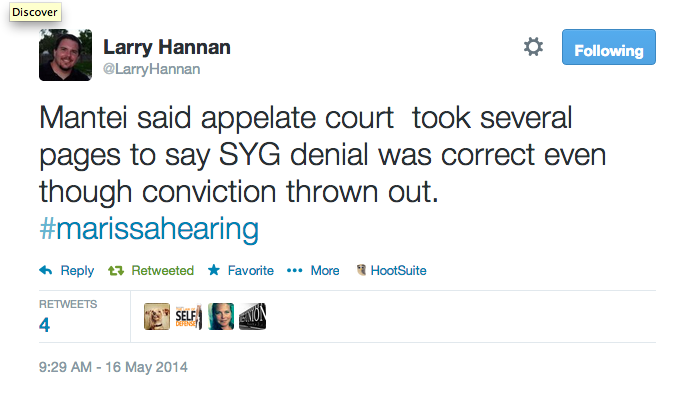
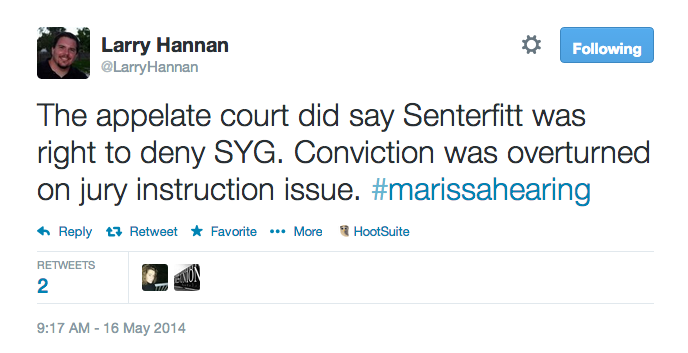
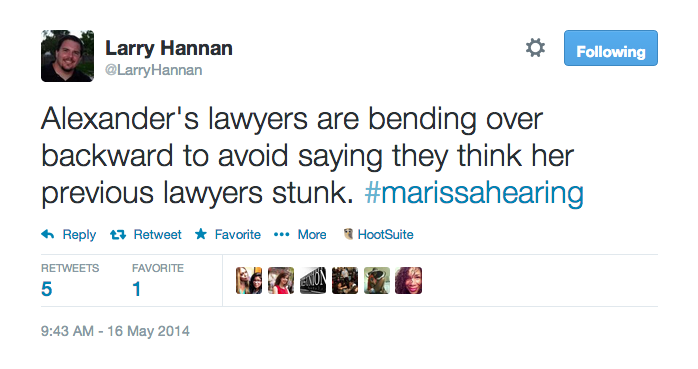
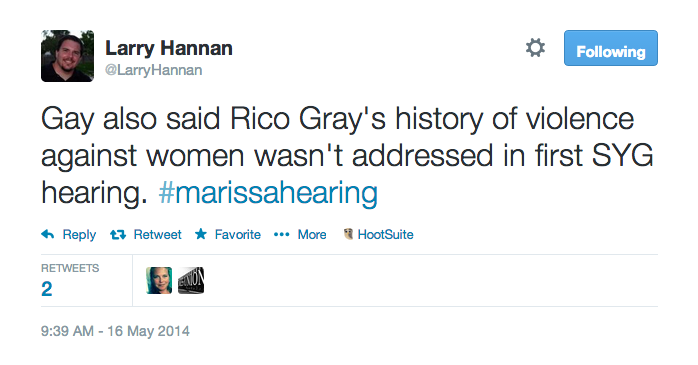
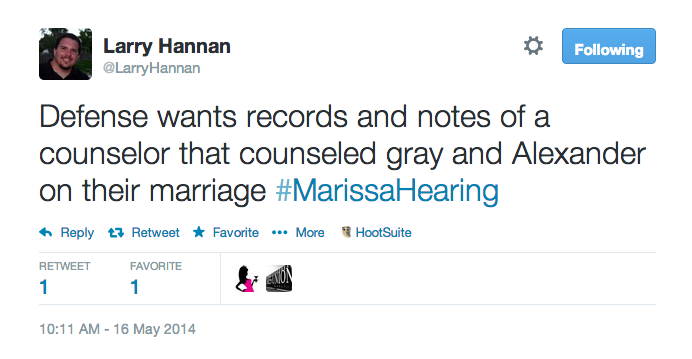
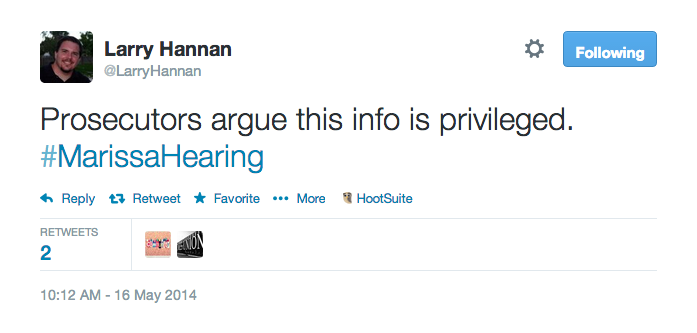
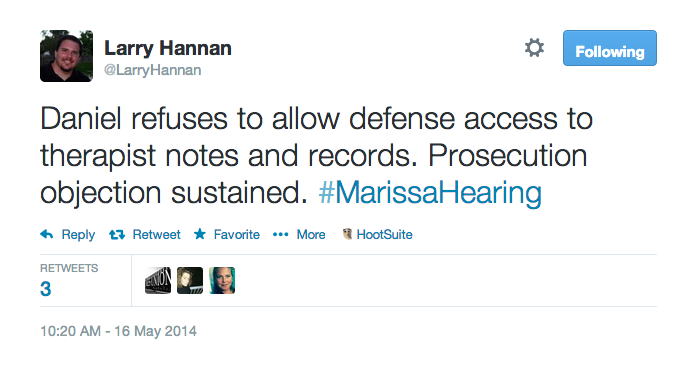
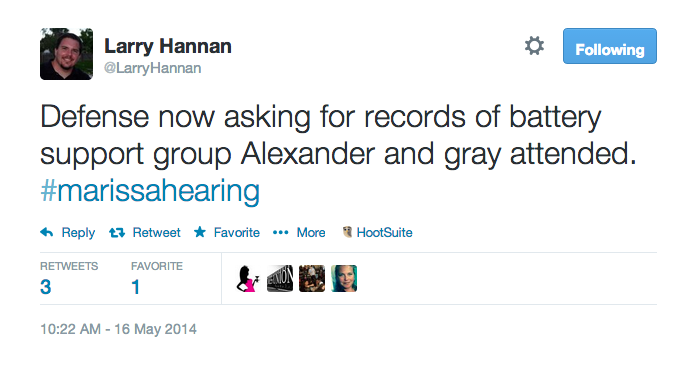
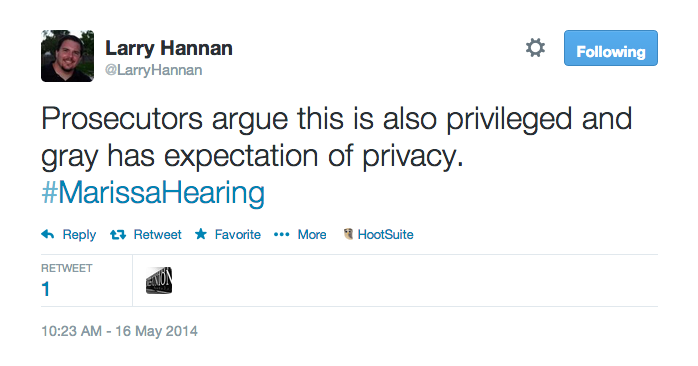
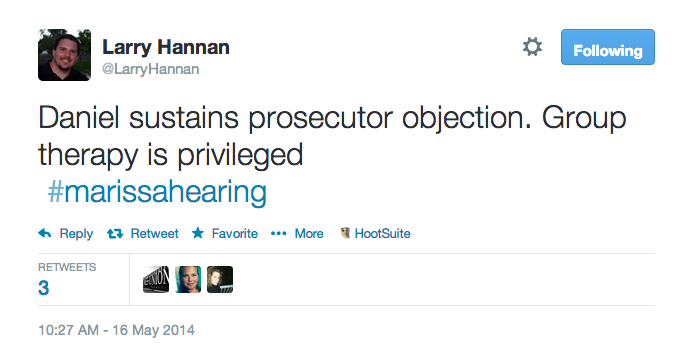

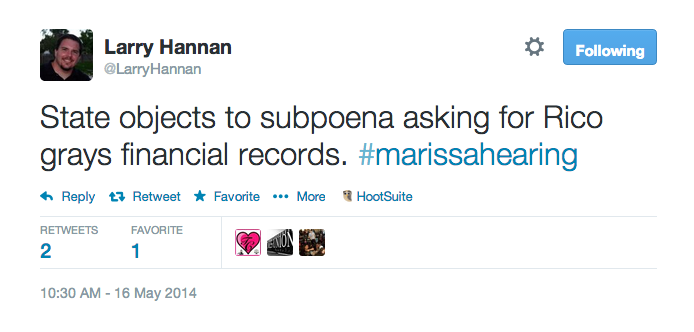
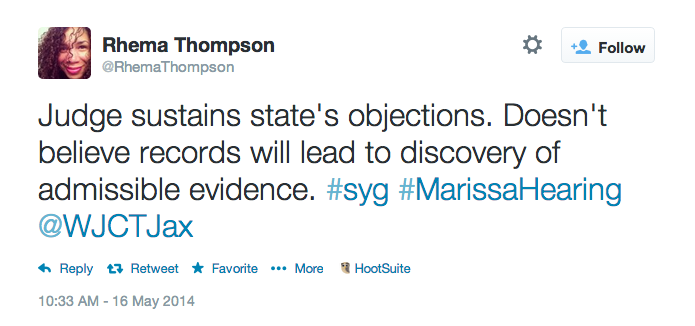
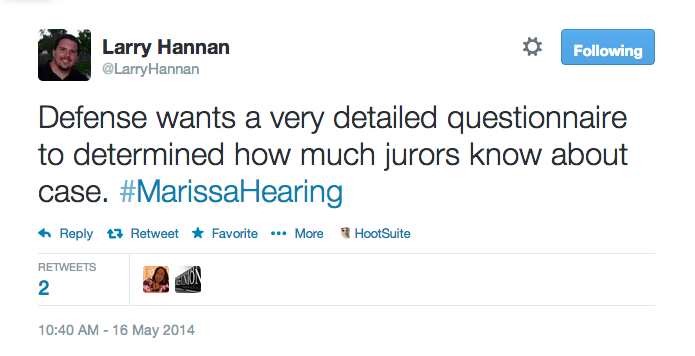
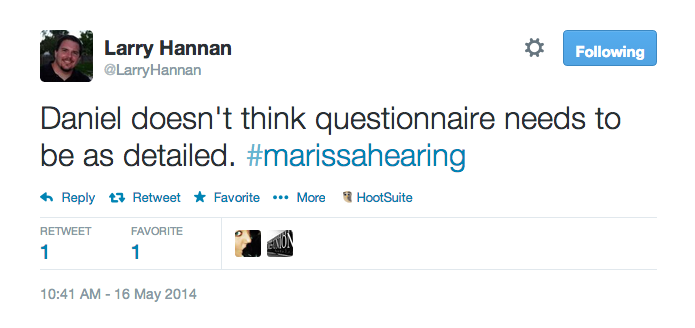
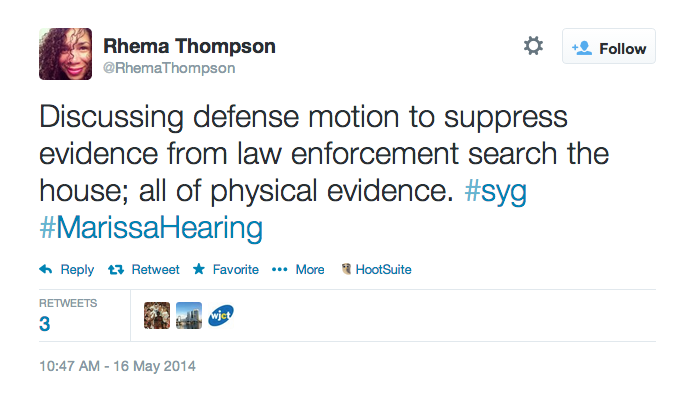
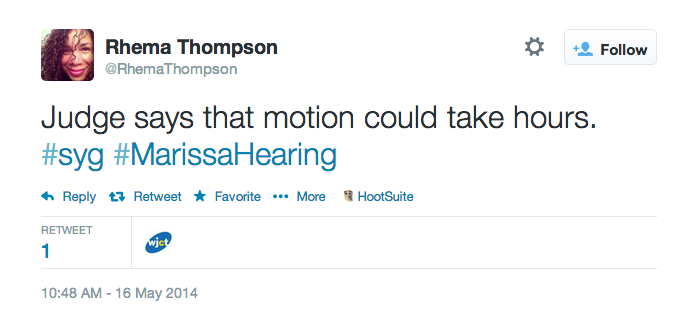







Comments
So if I understand this aright – there was nothing legally faulty about the original immunity hearing, and this is all Defense smoke & mirrors.
Pretty much. The defense is trying to fabricate something “new” for a second SD immunity hearing, or something defective about the original. But other than the fact that they’d really, really like one, I don’t see any real legal basis.
In any case, the actual trial is like in two months, and they have every opportunity to make the same immunity arguments at trial.
Which, of course, they have no chance of doing, as this simply wasn’t a self-defense shooting at all.
Unless, that is, they can get all the evidence suppressed. The defense lawyer’s “Royal Flush”. 🙂
I wouldn’t be hanging my hat on that last one.
–Andrew, @LawSelfDefense
It also sounds like the Defense Lawyer has gotten her knowledge of Self Defense Law from CNN. She might want to take a look at the actual law.
To me the Judge is in the worst position here, especially with the amount of media attention this case has gotten. He knows every decision is going to be turned over and over, so he is being extra careful.
Alexander wasn’t in fear of her life, she was pissed beyond the ability for reasonable thought and judgement.
going off memory here, so I may be WAY off, but it always seemed to me that SHE was the aggressor throughout all of it.
am I remembering right or wrong?
Ehhh, not really. It was a mutual argument that they were both engaging in at the time. Now I do believe she became the aggressor when she moved though a couple of rooms and doors, dug a gun out of the glove box in her car, then went back through those rooms and doors and fired a shot. Gray hadn’t “broken” into the home he was there because he was with his children and presumably with Alexanders consent.
Quin,Emmanuel… are really high fliers. In the same league as Boies, Schiller…
How did she ever get them?
What in the Wide World of Sports is going on here?
How could you EVER get all the evidence from the crime scene excluded?
It seems to me that once a shot is fired, the police have every right to enter. Once it is determined that a crime may have occurred, they have every right to secure and collect evidence.
I can’t imagine the argument that would result in excluding all evidence from the crime scene once the police have been called to the scene with a report of a shot fired and the shooter on site.
The very notion is ridiculous.
Shows their desperation.
Any prosecutor worth his salt is going to tell the jury the narrative of Alexander walking back in from that garage, gun in hand, and the bullet hole in the wall, and she’s done.
Heck, even a sucky prosecutor could do that.
There’s simply no coming back from the fact that Alexander achieved a position of safety, armed herself with a firearm, returned to the site of conflict, allegedly articulated some graphic threat, and fired a bullet past the head of her husband and his two minor children.
Then she ran away, and her husband had to call the police.
Self defense? Not so much.
–Andrew, @LawSelfDefense
Well, and the “warning shot” was not in the ceiling, but in the wall…
at the level of hubby’s head…
where his head had been just instants before.
So, no.
This is what a lot of very fine defense attorneys consider good, competent representation.
They will throw every remotely plausible defense at the court, and then at the jury if they feel the jury won’t hold it against their client. If it sticks, they may have done their job, which is to vigorously use the law to defend their client.
They may even have extended the legal understanding of a given statute or case-law.
No.
Pissing off a judge is one thing. Some lawyers like to do that.
But making frivolous motion after frivolous motion is another thing entirely. You lose the judges respect. When you lose a judges respect then you set yourself up for trouble. He will scrutinize your motions, your citations etc. It can mean the difference between getting a critical ruling and losing it.
No one should dispute or criticize the vigorous defense of a client, it ought be expected.
But at some point, aren’t attorneys supposed to be officers of the court? To attempt to exclude evidence from the crime scene itself without any basis in case law seems to be against the administration of justice, at best merely dilatory.
I presume Gay has SOME legal basis for her motion to suppress the physical evidence rom the crime scene. She’s a very competent lawyer (albeit with little criminal defense experience).
And certainly she’s obligated to present as vigorous a defense of her client as possible.
That said, it’s still entirely consistent for me to believe the effort at suppression to be silly.
(Granted, I suppose I ought to wait to hear her argument first. Fair is fair.)
–Andrew, @LawSelfDefense
Hear(ing) Hear(ing) !
A hearing (today) to decide to have another hearing (June 10)
to decide whether to have another hearing (self defense)
to decide whether to have another hearing (a trial)
And maybe a 4th hearing (trial).
“Here the defense argued that Alexander had the right to be in her home, did not have a duty to retreat”
This now means you can go out, get a gun ,and come right back armed and start shooting ?
“The defense then went on to make yet another remarkable self-defense law claim. Gay argued that as long as Alexander was in her home, if she is in imminent fear of harm she has a right to fire a gun.”
He means ‘to leave unimpeded, go get a gun, then come back and shoot it’ ?
If Ms Alexander, after shooting at (and thankfully missing) her ex and his kids, had accepted the 3-year plea offer Angela Corey originally offered her, she’d likely be out by now (or soon, anyway), the whole thing over.
Whoever told her she should reject the plea deal, and even with the damning forensics the State had, go to trial and hope to be found not guilty of any crime whatsoever, really blew it. IMHO.
OMFG!
http://www.salon.com/2014/05/16/trapped_in_the_dark_marissa_alexander_and_how_our_twisted_legal_system_re_victimizes_domestic_violence_survivors/
I don’t know whether to laugh or cry.
It’s Salon. Your best bet is just not bother with it.
I just checked out the comments under that article, and there seems to be a fair bit of pushback. I’d leave a comment myself, but apparently you have to sign in via Google or Facebook and I’m not keen to play that game. But it’s good to see a few truth-bombs dropped anyway.
Hey, it’s Salon. You know, “cosmetic” journalism. It’s where they put lipstick on pigs.
“He assaulted me, shoving, strangling and holding me against my will, preventing me from fleeing all while I begged for him to leave. After a minute or two of trying to escape, I was able to make it to the garage where my truck was parked, but in my haste to leave I realized my keys were missing. I tried to open the garage but there was a mechanical failure. I was unable to leave, trapped in the dark with no way out. For protection against further assault I retrieved my weapon; which is registered and I have a concealed weapon permit. Trapped, no phone, I entered back into my home to either leave through another exit or obtain my cell phone.”
OK, I’ll buy that much so far, at least to create reasonable doubt.
Then the question(s) are –
Did she have a duty to retreat when able (after returning inside), IOW leave her residence ? I think maybe not. Was it an available option ? Perhaps. But not a duty.
“She attempted to invoke Florida’s “stand your ground” law, but a pre-trial judge ruled that she could have escaped through the front or back doors of her own home. ”
Is there no Castle Doctrine in Florida ? ‘Could have’ does not equal ‘Duty’. Wisdom, perhaps, but not ‘Duty’.
(from different source)
“State Attorney Angela Corey is now seeking a 60-year sentence, 20 years for each person present when the shot was fired.”
3 sequential charges for one act ? If there were 10 people standing nearby, does she get 200 years for one shot ?
Andrew says “Again, deadly force self-defense cannot rest solely on a subjective fear of harm.”
How is the question ‘ how much fear was she in’ EVER not ‘subjective’ ?
IMO, it boils down to ‘was she reasonably in fear of her life or grave bodily harm ?’ – from this guy standing there against the wall with his two kids, looking at a woman holding a gun on him.
I have to say ‘no’. thus, guilty. But for 20 years (with the ‘shot fired’ enhancement) for the one act, not 60.
Actually I just found out that it wasn’t her residence, it was his, she had just spent the night there, she hadn’t lived there for a couple of months. I don’t know that it changes anything since I would guess she had a key and therefore at least implied permission to be in the house.
As far as the 60 year sentence, I agree it sounds kind of excessive to me. However, she endangered the life of 2 children so my sympathy is limited. Also, she was offered a very reasonable plea deal, considering the evidence, which she refused and decided to go to trial. So if she does end up getting 60 years I am sure I won’t feel very sorry for her.